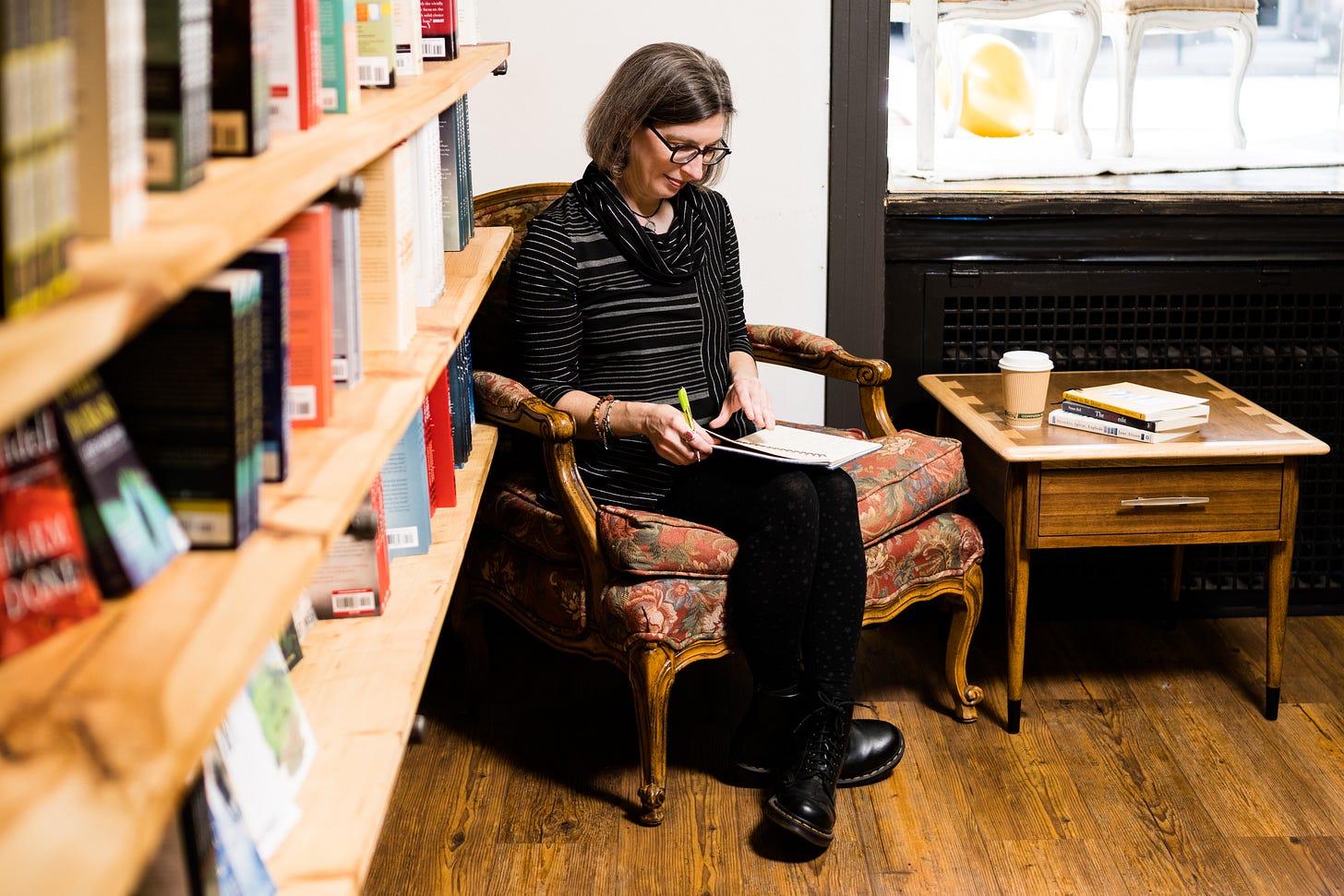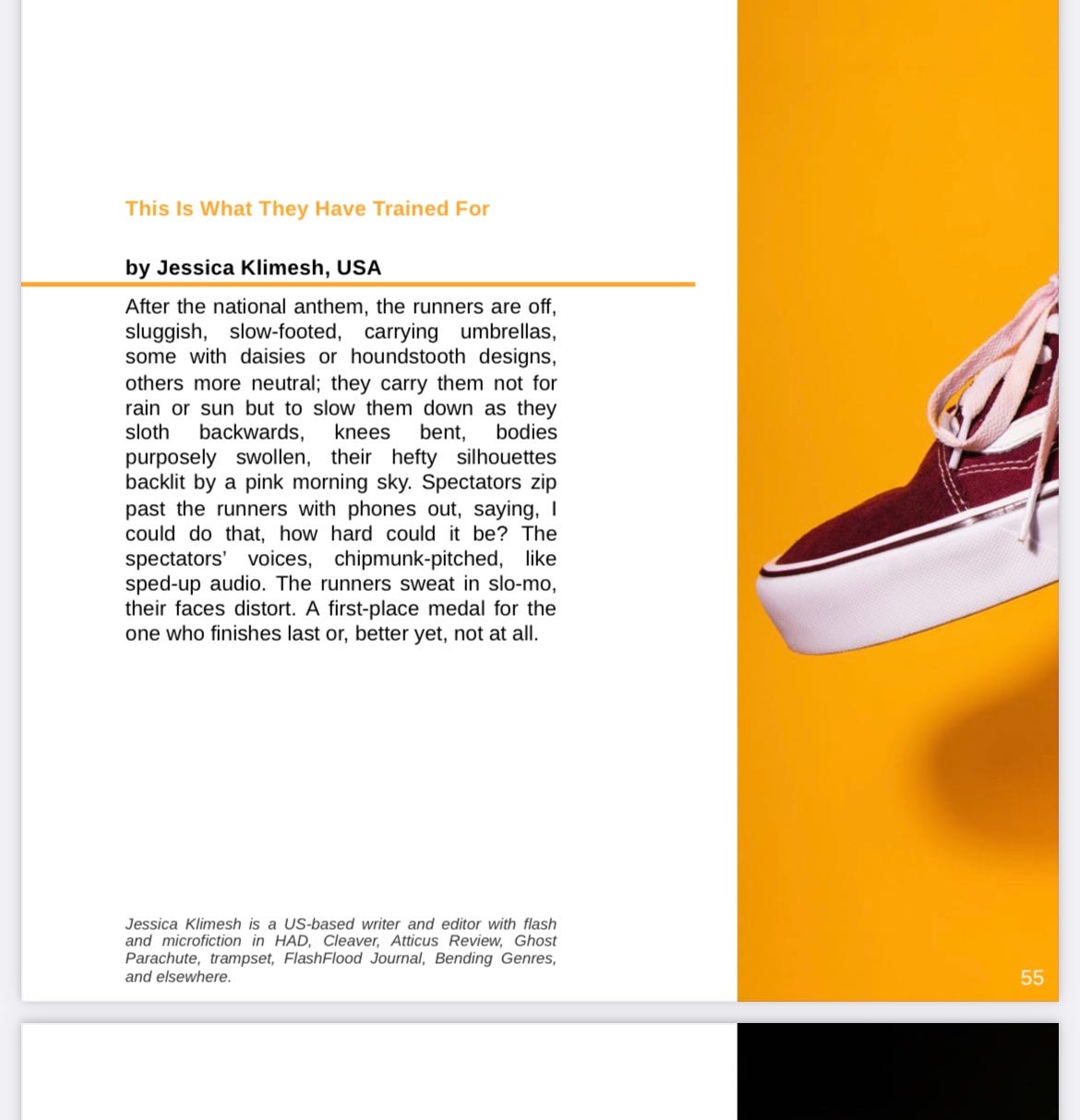Festivals, Freewriting, and Prompts (Oh, My!)
Last week I attended Literary Cleveland’s Flash Fiction Festival 2023, a week-long virtual event focused on—you guessed it—flash fiction. Although I’ve long had an affinity for flash fiction, it’s only been since 2020 (with sincere thanks to the pandemic) that I’ve come to consider myself a “serious” (subjective as that may be) flash fiction writer. (Lately, I’ve become intrigued with even shorter forms as well, such as 50- and 100-word stories and would definitely recommend Meg Pokrass’s online microfiction workshops.)
I attended Literary Cleveland’s Flash Fiction Festival last year as well, and in November, I also attended their Flash Nonfiction Festival, even though I don’t consider myself a creative nonfiction (CNF) writer. (While I’ve taken a few CNF classes/workshops and have a number of in-process drafts, my creative writing background is substantially more fiction-focused.)
One thing I especially like about writing festivals/events/workshops is the exposure to new writing: stories/authors I may not otherwise have come across. I almost always find myself ordering new reading material and/or perusing new (to me) literary journals and adding them to my favorites on Duotrope.
But perhaps my favorite thing is the writing prompts. Prompts are kind of crazy things. I mean, it’s easy enough to create your own, but for some reason, having someone else present a prompt to you—especially in conjunction with story examples—is different. It’s like food; food almost always tastes better when prepared by someone else (for me, at least!).
And then there’s the “freewriting” aspect—writing on the spot in a workshop…
[Note: Freewriting as I’m referring to it here may not be true freewriting—definitions differ—but I generally consider it as such.]
What Is Freewriting?
Prompts and freewriting don’t have to go hand-in-hand. You can freewrite without a prompt, and you can respond to a prompt without freewriting. Even so, I tend to link the two together because I think that any time you’re responding to a prompt within a time constraint and without prior preparation, this is freewriting.
[For a more in-depth dive, check out this blog post I wrote four years ago on the benefits of writing prompts and freewriting.]
Photograph of Jessica Klimesh. Photo credit: Rebecca Trumbull Photography.
Letting Go of Expectations
On my blog, I’ve written periodically about how writing “rules” and expectations can be detrimental to the creative writing process. During last week’s Flash Fiction Festival, it was stated on several occasions by more than one of the workshop facilitators that fiction is an extremely flexible form. This flexibility is what I love about fiction; it’s what draws me in (both as a reader and a writer) again and again. It’s also what, for me, makes freewriting and/or using prompts such a valuable exercise or practice: there are no expectations, either of the writing itself or of oneself as a writer.
I was once the type of person who hated writing on the spot. (I occasionally still am.) When given a prompt and five minutes to write, I would freeze up. After five minutes, the facilitator would ask, “Who wants to share?” and I’d always listen in awe to these magnificent pieces people wrote right there, in that moment. I’d look at my blank paper (or screen) and wonder what was wrong with me. Even if I did manage to write something, it was almost never something I’d be willing to share.
I’m not sure exactly when or how all of that changed, but I’ve noticed within the last couple of years that I now can, in fact, respond to a prompt and produce something that I don’t hate in a block of five minutes. I suspect it has something to do with writing in the privacy of my own space, my Zoom video and sound turned off; I’m not distracted. (And, also, after nearly three years of virtual events, I’m used to it!) During last week’s festival, I even volunteered (twice!) to share what I wrote during these short writing prompt exercises! But I think it also has a lot to do with letting go of expectations—expectations of what fiction is and expectations of myself.
And also: PRACTICE.
Practice Makes Better
Although I’ve been writing regularly and attending writing groups of some form since the mid-1990s, it’s only been within the last seven years or so that I’ve made creative writing a more serious priority in my life. In 2015, I moved to Iowa City, where I was exposed to an active and diverse literary community. Prompted by those experiences, I entered into an MFA program for fiction in 2017, graduating in 2019.
But 2020 was the pivotal year.
In April 2020, knee-deep in pandemic uncertainty, I started a weekly virtual write night, attended by writers from various parts of the U.S. (and open to anyone). This weekly group got me into a regular routine of writing, revising, and submitting. And a funny thing happened: my writing improved. I was practicing writing every Monday night without fail. I was actively honing my writing skills. I was often writing at other times during the week, too, but given the nature of my job—in which I’m reading and writing/editing for work—my own creative writing practice can be sporadic.
Practice doesn’t make perfect (perfection is a myth), but it certainly helps one to improve. It helps build confidence, decreases anxiety. To the point where one day you’re sitting in a workshop where the facilitator tells you you’re going to write for five minutes, and you don’t even flinch. Instead, you eagerly await the prompt.
Where Stories Come from: What if…?
As you probably know, inspiration—prompts—can come from (literally) anywhere: bits of conversation overheard in a coffee shop or grocery store, an intriguing line from a TV show. Whenever I’ve seen a shoe in an odd place (up in a tree, hanging from a telephone pole, or in the middle of the street—and this has happened more than one might expect), my curiosity is piqued. How did that shoe get there? Why just one shoe?
The other day at a cafe, I took a sip of water. The cup was obviously quite full because after I took the sip, it didn’t look like any water had even left the cup. I immediately thought to myself: What if the water just kept refilling itself as I drank? There’s a story there.
Prompt and Examples
There’s always a story. What if when you put your car into drive, it went in reverse, and when you put it into reverse, it went forward?
Prompt: What if…? What if the opposite of what should happen were to happen? Think of an everyday action/occurrence and consider what would happen if that action/occurrence didn’t work as it should, or as nature says it should.
As an example, check out this amazing story by Kara Oakleaf, published in Smokelong Quarterly, called “Gravity, Reduced.”
Or my 100-word story, “This Is What They Have Trained For,” in Issue 7 of The Dribble Drabble Review. (Because this story is so short, I’ve also included a screenshot below.)
Write—suspend reality—for just five minutes of freewriting and see what happens.
Stretch and Learn
Writing exercises are just that: exercises. Practice. It’s how we improve as writers. It’s how we stretch and learn. And if something comes out of the exercises, all the better! But if it doesn’t, that’s okay, too.





